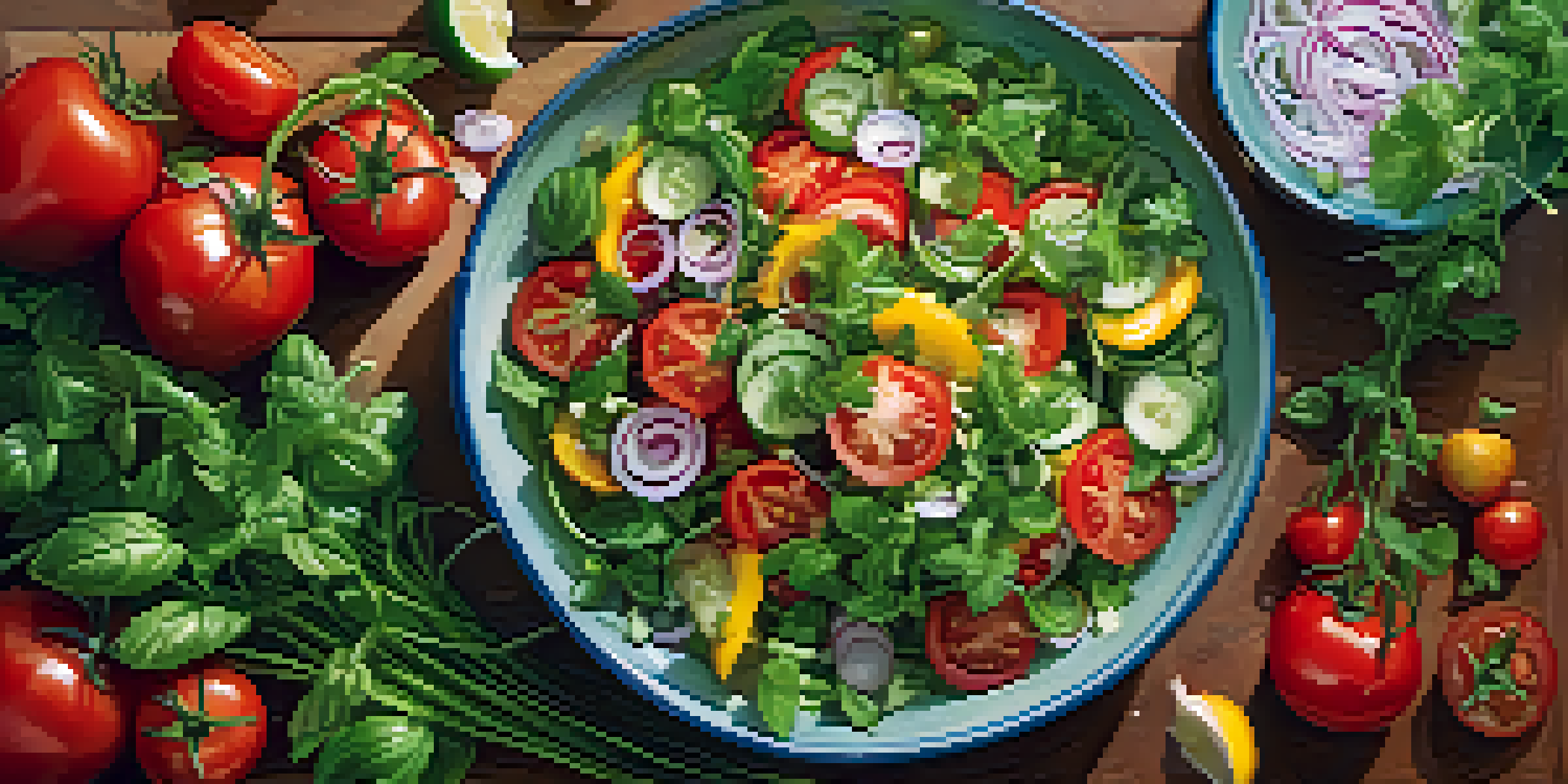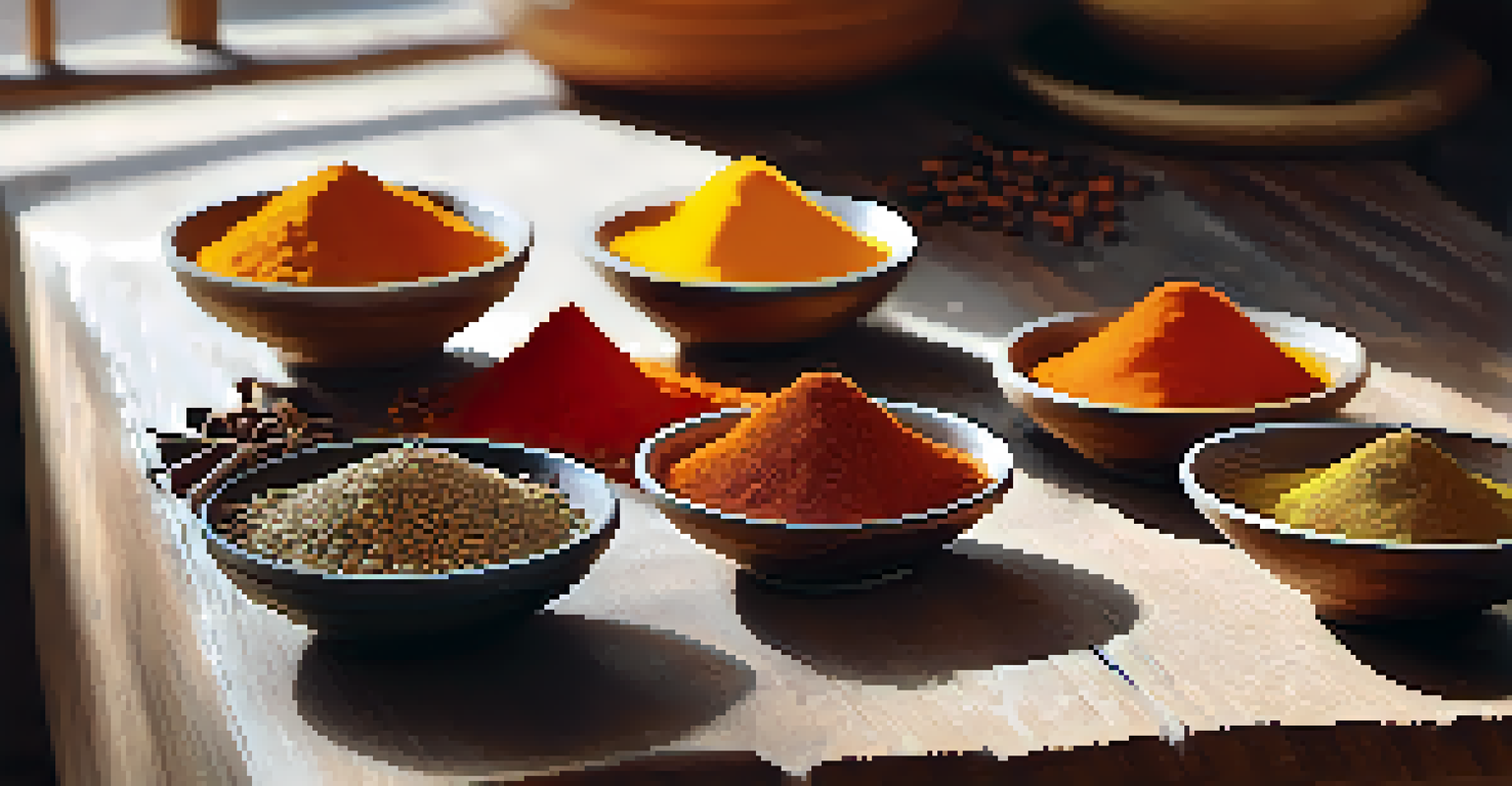Herbs and Spices to Elevate Your Vegetarian Dishes

The Power of Fresh Herbs in Vegetarian Recipes
Fresh herbs can truly transform a vegetarian dish, adding layers of flavor and aroma. Basil, cilantro, and parsley are just a few examples that can brighten up salads and sauces. These herbs not only enhance taste but also offer a burst of freshness that dried alternatives often lack.
Herbs and spices are the soul of cooking. They can elevate a dish from ordinary to extraordinary.
Incorporating fresh herbs is easy; simply chop them finely and sprinkle them over your dish before serving. This technique not only elevates the flavor profile but also adds a beautiful pop of color. For example, a sprinkle of fresh basil on a tomato sauce can make it feel vibrant and lively.
Don’t be afraid to experiment with different combinations. For instance, combining mint and dill can create an unexpected yet delightful flavor in a yogurt dressing for salads. The key is to start with a few fresh herbs and adjust according to your taste.
Spices: The Hidden Gems of Flavorful Vegetarian Dishes
Spices are the unsung heroes of vegetarian cooking, often overlooked but incredibly powerful. A dash of cumin or smoked paprika can turn a simple vegetable stir-fry into a dish bursting with character. These spices add depth and warmth, making your meals feel more satisfying.

Think of spices like a painter’s palette; each one brings a unique color and tone to your dish. For example, turmeric not only adds a golden hue but also offers health benefits. It’s fascinating how a small pinch can make such a difference in both taste and appearance.
Fresh Herbs Enhance Flavor Profile
Using fresh herbs like basil and cilantro can elevate vegetarian dishes with vibrant flavors and aromas.
When cooking with spices, remember to toast them lightly in a pan before adding them to your dish. This simple step releases their essential oils, enhancing their flavor significantly. It’s a small trick that can elevate your meals from ordinary to extraordinary.
Using Aromatic Spices to Boost Your Vegetable Dishes
Aromatic spices like cinnamon, cardamom, and cloves can add warmth and complexity to vegetarian dishes. While often associated with sweet recipes, they can also work wonders in savory meals. Imagine a roasted vegetable medley seasoned with cinnamon; it’s a delightful surprise for your taste buds.
Cooking is like love. It should be entered into with abandon or not at all.
These spices can create a comforting and inviting atmosphere in your kitchen. For instance, a pinch of cloves in a lentil stew can impart a rich, aromatic flavor that feels both exotic and familiar. It’s all about finding that perfect balance.
Don’t hesitate to play with these bold flavors. A little experimentation can lead to delicious discoveries. Combining aromatic spices with traditional herbs can create a unique flavor profile that takes your cooking to the next level.
The Versatility of Garlic and Onions in Vegetarian Cooking
Garlic and onions are staples in many kitchens, and for good reason! They serve as the foundation for countless vegetarian dishes, providing depth and richness. Whether you sauté them, roast them, or use them raw, they bring a wonderful flavor that complements various vegetables.
Think of garlic as your secret weapon; it can elevate the simplest of dishes. A garlic-infused olive oil drizzled over steamed veggies can transform an ordinary meal into something special. Onions, too, add sweetness and complexity when caramelized.
Spices Add Depth to Dishes
Incorporating spices such as cumin and smoked paprika can transform simple meals into flavorful experiences.
Mixing these ingredients with other spices can create a flavor explosion. For example, combining garlic, ginger, and chili can create a zingy base for a stir-fry. The beauty of these ingredients lies in their ability to adapt to any cuisine, making them essential for every vegetarian cook.
Adding Heat: The Role of Chili Peppers in Vegetarian Dishes
Chili peppers can add a delightful kick to vegetarian dishes, bringing excitement to your plate. Whether you prefer fresh jalapeños or dried red pepper flakes, a dash can awaken your taste buds and transform a dish. They introduce an element of surprise that can elevate your cooking.
Heat doesn’t have to be intimidating; start with milder varieties if you're not a fan of spice. Ancho chili powder, for instance, adds smoky flavor without overwhelming heat. It’s a great way to introduce a little warmth without going overboard.
Experimenting with different chilies can be a fun adventure in your kitchen. Try adding them to sauces, soups, or even roasted vegetables for an unexpected twist. The key is to find the right balance that suits your palate.
The Art of Blending: Creating Custom Spice Mixes
Creating your own spice blends can be a game changer in vegetarian cooking. By mixing your favorite spices and herbs, you can tailor flavors to suit your preferences. Think of it as crafting your signature seasoning that reflects your culinary style.
For example, a simple blend of cumin, coriander, and smoked paprika can work wonders on roasted vegetables or grains. It’s an easy way to add depth and personality to your dishes. Plus, it can be a fun way to experiment with new flavor combinations.
Herbs and Spices Offer Health Benefits
Many herbs and spices not only enhance taste but also provide significant health benefits, making meals nutritious and enjoyable.
Don’t hesitate to get creative! Try incorporating different spices based on what you have on hand or what you're in the mood for. This approach not only enhances your cooking but also makes meal prep feel more adventurous.
Herbs and Spices for Health Benefits in Vegetarian Meals
In addition to enhancing flavor, many herbs and spices offer impressive health benefits. For example, turmeric is known for its anti-inflammatory properties, while ginger can aid digestion. By incorporating these ingredients into your vegetarian dishes, you're nourishing your body as well as your taste buds.
Herbs like oregano and thyme are rich in antioxidants, making them great choices for boosting your health. Adding these to your meals can be an easy way to incorporate more nutrients. Plus, they add a burst of flavor that makes healthy eating enjoyable.

Don’t forget about the power of garlic; it’s been linked to various health benefits, including heart health. By choosing herbs and spices wisely, you can create meals that are not only delicious but also beneficial for your overall well-being.